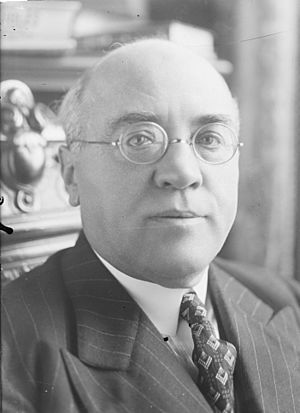Albert Sarraut facts for kids
Quick facts for kids
Albert Sarraut
|
|
|---|---|
 |
|
| Prime Minister of France | |
| In office 24 January 1936 – 4 June 1936 |
|
| President | Albert Lebrun |
| Preceded by | Pierre Laval |
| Succeeded by | Léon Blum |
| In office 26 October 1933 – 26 November 1933 |
|
| President | Albert Lebrun |
| Preceded by | Édouard Daladier |
| Succeeded by | Camille Chautemps |
| Governor-General of French Indochina | |
| In office 15 November 1911 – 22 November 1913 |
|
| Preceded by | Paul Louis Luce |
| Succeeded by | Joost van Vollenhoven |
| In office 22 January 1917 – 9 December 1919 |
|
| Preceded by | Jean-François dit Eugène Charles |
| Succeeded by | Maurice Antoine François Monguillot |
| Personal details | |
| Born | 28 July 1872 Bordeaux, Gironde, France |
| Died | 26 November 1962 (aged 90) Paris, France |
| Political party | Radical |
Albert-Pierre Sarraut (born July 28, 1872 – died November 26, 1962) was an important French politician. He was a member of the Radical Party. Sarraut served as Prime Minister of France two times. This was during a period in French history called the Third Republic.
Contents
About Albert Sarraut
Albert Sarraut was born in Bordeaux, a city in France, on July 28, 1872.
Early Political Life
In 1907, Sarraut was a senator for the area of Aude. He was also an under-secretary of state for the Interior. He became involved in a protest by winegrowers in the Languedoc region. Sarraut tried to help the people he represented.
He disagreed with how the government was handling the protests. Because of this, Sarraut decided to resign from his government position. This showed that he was willing to stand up for his beliefs.
Governor of French Indochina
Sarraut served as the Governor-General of French Indochina twice. His first term was from 1912 to 1914. His second term was from 1917 to 1919. French Indochina was a group of French colonies in Southeast Asia.
He was known for trying to improve education for the local people there. However, he believed that Vietnamese people needed to adopt French ways of thinking. He thought this was necessary for them to become "civilized."
Sarraut also actively supported local arts and culture. For example, he helped French art expert George Groslier. Groslier worked to preserve Cambodian arts and traditions. Sarraut also helped fund the design and building of the National Museum of Cambodia.
In 1920, he became the Minister of the Colonies. This role involved managing France's overseas territories.
Later Years and Retirement
In 1940, Sarraut voted on an important decision. He voted to give Marshal Philippe Pétain's government the power to create a new constitution. This decision effectively ended the Third Republic. It also led to the creation of Vichy France.
After this, Sarraut decided to retire from politics. He then took over his family's newspaper, La Dépêche de Toulouse. He did this after his brother, Maurice Sarraut, passed away in 1943.
Albert Sarraut died in Paris, France, on November 26, 1962. A school in Hanoi, Vietnam, was named the Lycée Albert Sarraut in his honor.
See also
 In Spanish: Albert Sarraut para niños
In Spanish: Albert Sarraut para niños
 | Jackie Robinson |
 | Jack Johnson |
 | Althea Gibson |
 | Arthur Ashe |
 | Muhammad Ali |

